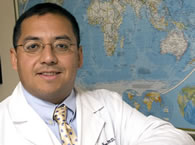News Release: Emory Healthcare, Research, School of Medicine
Mar. 30, 2009
Emory Sound Science Podcast: Attending to Neglected Tropical Diseases
 Carlos Franco-Paredes, MD, MPH. Listen to Franco talk about his work on the latest edition of "Sound Science."
Carlos Franco-Paredes, MD, MPH. Listen to Franco talk about his work on the latest edition of "Sound Science."Infectious tropical diseases such as leprosy, hepatitis B, and Chagas disease are increasingly finding their way into Georgia's immigrant and refugee communities.
Carlos Franco-Paredes, MD, an Emory researcher and clinician, and his colleagues at the Emory TravelWell Clinic, recently received funding from the Healthcare Georgia Foundation to study the epidemiology and treatment outcomes of infectious tropical diseases, also known as neglected tropical diseases, in Georgia's growing immigrant and refugee communities. The work builds on an initial seed grant from the Emory Global Health Institute.
To listen to Franco-Paredes' own words about neglected tropical diseases, access Emory's new Sound Science podcast at http://whsc.emory.edu/soundscience/.
An expert in infectious diseases, Franco-Paredes and his colleagues provide pre- and post-travel health care to international travelers at Emory's TravelWell Clinic located at Emory University Hospital Midtown. The clinic serves the community, faculty, staff, students, corporate travelers and volunteers.
"The Healthcare Georgia Foundation grant will help us focus on all these neglected tropical diseases: to continue to do work on assessing the prevalence and the outcomes of hepatitis B, Chagas disease, and leprosy," says Franco-Paredes. "These neglected diseases cause a lot of disability and dysfunction."
The clinic is the region's main referral center for leprosy. "Right now, we care for about 24 patients with leprosy," says Franco-Paredes. "Leprosy is a chronic disease. Most of these cases are in foreign-born individuals, particularly patients from South and Central America and Asia. But we care for one patient who has never traveled outside the United States," he notes.
Franco-Paredes and his colleagues also care for patients with parasitic diseases, such as hookworm, as well as hepatitis B. "Hepatitis B is more frequent and has lethal consequences. After the initial screening, sometimes follow up takes a few years. So, bridging the gap of early diagnosis and screening to get patients into care, the right care for hepatitis B, is one of the problems we sometimes find," says Franco-Paredes.
One of the studies included in the Healthcare Georgia Foundation grant includes screenings at Grady Hospital for Chagas disease in pregnant women from Latin America. "If you're from Latin America and you have HIV/AIDS, Chagas disease can become a real problem," says Franco-Paredes. "In the United States, there are no studies that look at how often you find this latent infection. Although the US Public Health Service guidelines recommend screening for Chagas disease, no one does that routinely. If we screen patients from Latin American and we find a few of them have a latent infection, this will justify expanding the recommendation and may prevent later complications."
Franco-Paredes received his MD degree from La Salle University School of Medicine, Mexico. He completed his residency and a fellowship in Internal Medicine at Emory School of Medicine and was a fellow in the AIDS International Training and Research Program in the NIH-sponsored Fogarty Institute at Emory.
In July 2004, he joined the Emory School of Medicine faculty in the Division of Infectious Diseases as a clinician, teacher and researcher. He has a joint appointment with the Hubert Department of Global Health at Emory's Rollins School of Public Health. He holds a clinical appointment at the Hospital Infantil de Mexico, Federico Gomez in Mexico City. He participates in influenza vaccine and influenza epidemiology research in children and is part of the WHO consultant group of the Global Action Plan for Influenza Vaccine Production.
Franco-Paredes is a member of the American College of Physicians, Infectious Disease Society of America, International Society for Travel Medicine, and American Society for Tropical Medicine and Hygiene.
For more information about the Emory TravelWell Clinic, visit http://www.emoryhealthcare.org/departments/travelwell.
###
The Robert W. Woodruff Health Sciences Center of Emory University is an academic health science and service center focused on missions of teaching, research, health care and public service. Its components include schools of medicine, nursing, and public health; Yerkes National Primate Research Center; the Emory Winship Cancer Institute; and Emory Healthcare, the largest, most comprehensive health system in Georgia. The Woodruff Health Sciences Center has a $2.3 billion budget, 17,000 employees, 2,300 full-time and 1,900 affiliated faculty, 4,300 students and trainees, and a $4.9 billion economic impact on metro Atlanta.
Learn more about Emory’s health sciences:
Blog: http://emoryhealthblog.com
Twitter: @emoryhealthsci
Web: http://emoryhealthsciences.org
